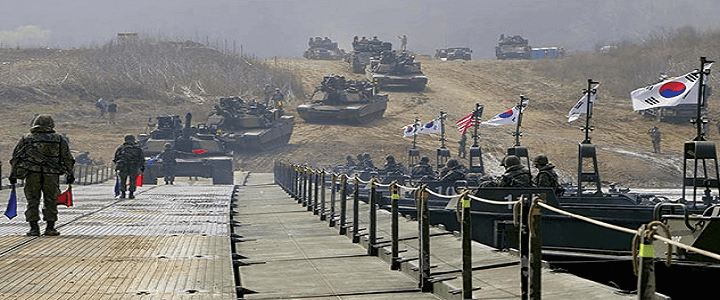It is done. President Donald Trump and Chairman Kim Jong-un of the Democratic People’s Republic of Korea have concluded the first face-to-face meeting between a sitting U.S. president and a North Korean leader. “This whole thing is unconventional,” Jakes Clapper, the former director of national intelligence, said on CNN Monday night.
It sure is. The U.S. will suspend military exercises but maintain economic sanctions, and President Trump says he expects the North Koreans to move “very, very quickly” towards denuclearization. In a joint statement, the two leaders called the summit an “epochal event of great significance,” and affirmed “the DPRK commits to work toward complete denuclearization of the Korean Peninsula.”
An unlikely meeting
In my defense, lots of people thought we’d never get to this moment. But we were wrong. And Trump gets the lion’s share of the credit for moving the Koreans from their “immovable force” posture in January to today.
Trump and Kim met, shook hands in front of the cameras, smiled, faced the press, and withdrew for a 45-minute private conversation in the Capella Hotel on Singapore’s Sentosa Island, before joining their top aides for lunch and more formal talks. The gravitas and historical nature of this summit cannot be overstated.
What comes of it is an entirely different matter. This meeting, however groundbreaking, is just the start of a long road to that, God willing, leads to the complete, verifiable, and irreversible denuclearization of the Korean Peninsula. There can be no other acceptable outcome. But that outcome is not guaranteed.
There are a million things that can still go wrong. What constitutes acceptable means of verification? How do we define “irreversible?” Although the U.S. withdrew its tactical nuclear weapons from Korea (and everywhere else) in 1992, what kind of commitment will the DPRK insist we make towards the denuclearization of the entire peninsula? A question hanging out there is whether a not flying B-1 and B-52 bombers over South Korea is an acceptable concession for the U.S. to make. It seems as though in the short run there is little harm in taking that step, but no one except the DPRK, China, and Russia would be comfortable with removing Korea from the shelter of the U.S. “nuclear umbrella.”
Where do we go from here?
Trump and Kim appear to be at ease with each other. That is good. Smiles are hard to fake, and Kim was positively beaming. The naysayers will say this is because he is getting what he wants: a tete-a-tete with the world’s most powerful nation. This meeting will solidify his standing with his own people, who will believe that Juche, the DPRK philosophy of self-reliance, has brought them to prominence on the international stage. It hasn’t, and this meeting will do little to improve Kim’s standing with other world leaders until the U.S. government says it’s okay. U.S. sanctions are still a more powerful weapon than Kim’s charm.
But if regime change is off the table, then a stable DPRK government with Kim at the helm is a good thing. He has made encouraging internal moves in the last week or two, replacing older senior officials with more “moderate” replacements. The devil you know is usually better than the one you don’t. If the Korean Peninsula is to remain divided (a medium-term outcome that seems all but obvious), then it’s better to have Kim at the helm than whoever might come next.
There is an interesting discrepancy that hasn’t received much attention. As Trump and Kim faced the press in a “spray,” where the two sat side-by-side for photographers and a few questions, Kim made what I think might be his first statement directly to the Western press. According to the official transcript on the White House’s website, Kim said, “Well, it was not easy to get here. The past worked as fetters on our limbs, and the old prejudices and practices worked as obstacles on our way forward. But we overcame all of them, and we are here today.”
But on Twitter, ABC News White House correspondent Jonathan Karl reported the statement differently: “It was not an easy path here. There’s a history of holding onto our ankles, and it appeared there were times that there were unfortunate practices where they were trying to block our eyes and our path, but we’ve overcome everything and come to this place.”
Needless to say, “holding onto our ankles” and “the past worked as fetters on our limbs” carry starkly different connotations. I will be interested to see how other Korean speakers translate Kim’s words. Because if Karl’s translation is correct, Kim was saying that the world has tried to screw North Korea, not simply tried to shackle them. That indicates how seriously the Koreans view the situation, and that they’re not exactly ready to roll over.
They feel slighted by history and want to be treated like adults. We will see if they act like they deserve it, though.
But overall, this historic event is a very positive step in the right direction that is reducing tensions that have existed between North and South Korea since the signing of the ceasefire in 1953. But there’s a long way to go yet.




